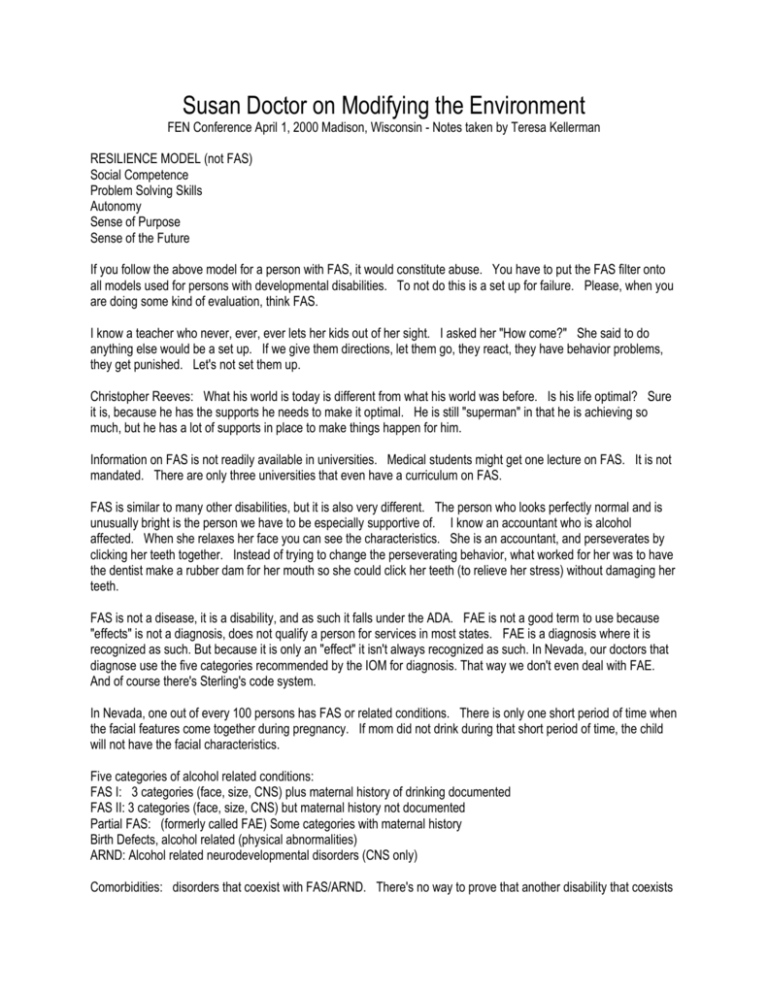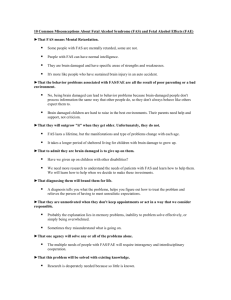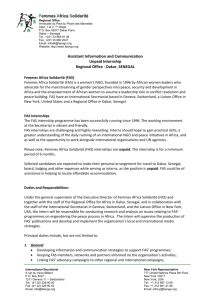Susan Doctor on Modifying the Environment
advertisement

Susan Doctor on Modifying the Environment FEN Conference April 1, 2000 Madison, Wisconsin - Notes taken by Teresa Kellerman RESILIENCE MODEL (not FAS) Social Competence Problem Solving Skills Autonomy Sense of Purpose Sense of the Future If you follow the above model for a person with FAS, it would constitute abuse. You have to put the FAS filter onto all models used for persons with developmental disabilities. To not do this is a set up for failure. Please, when you are doing some kind of evaluation, think FAS. I know a teacher who never, ever, ever lets her kids out of her sight. I asked her "How come?" She said to do anything else would be a set up. If we give them directions, let them go, they react, they have behavior problems, they get punished. Let's not set them up. Christopher Reeves: What his world is today is different from what his world was before. Is his life optimal? Sure it is, because he has the supports he needs to make it optimal. He is still "superman" in that he is achieving so much, but he has a lot of supports in place to make things happen for him. Information on FAS is not readily available in universities. Medical students might get one lecture on FAS. It is not mandated. There are only three universities that even have a curriculum on FAS. FAS is similar to many other disabilities, but it is also very different. The person who looks perfectly normal and is unusually bright is the person we have to be especially supportive of. I know an accountant who is alcohol affected. When she relaxes her face you can see the characteristics. She is an accountant, and perseverates by clicking her teeth together. Instead of trying to change the perseverating behavior, what worked for her was to have the dentist make a rubber dam for her mouth so she could click her teeth (to relieve her stress) without damaging her teeth. FAS is not a disease, it is a disability, and as such it falls under the ADA. FAE is not a good term to use because "effects" is not a diagnosis, does not qualify a person for services in most states. FAE is a diagnosis where it is recognized as such. But because it is only an "effect" it isn't always recognized as such. In Nevada, our doctors that diagnose use the five categories recommended by the IOM for diagnosis. That way we don't even deal with FAE. And of course there's Sterling's code system. In Nevada, one out of every 100 persons has FAS or related conditions. There is only one short period of time when the facial features come together during pregnancy. If mom did not drink during that short period of time, the child will not have the facial characteristics. Five categories of alcohol related conditions: FAS I: 3 categories (face, size, CNS) plus maternal history of drinking documented FAS II: 3 categories (face, size, CNS) but maternal history not documented Partial FAS: (formerly called FAE) Some categories with maternal history Birth Defects, alcohol related (physical abnormalities) ARND: Alcohol related neurodevelopmental disorders (CNS only) Comorbidities: disorders that coexist with FAS/ARND. There's no way to prove that another disability that coexists was caused by the alcohol exposure, but we would be fools to assume that the developing fetus is not vulnerable to damage that causes the other disorders. Fetal Alcohol is the umbrella and all the other things come under that. FAS determines how they process, and how they process determines how we treat everything else. How many times has the person with ARND been sent to therapy? If the therapist does not understand FAS issues, the therapy might not be effective. We want to be sure that the person we are referring to has an understanding of the base disability, FAS. Anger management is based on insights and cause-and-effect understanding. This is not necessarily the way to help a person with FAS. If you have frontal lobe damage, you are just not going to get it. Impulsivity is when the space between the thought and the action is missing, where the frontal lobes monitor the intentions of the rest of the brain. There is a gap in the thought process and the person goes directly from thought to action. We had a bus accident where 4 kids were killed, they were special ed kids. A teacher said, "Well at least they were throw-away kids." I was this close to her, with her hand on my shoulder. And I just wanted to lose it. I had to tell myself I couldn't even say anything to her, or I would just tear her apart, and I had to tell myself to just walk away. A person with FAS might not be able to have that little talk with themselves in between the action and the reaction. A person with FAS would feel the desire to hurt the person and do it. There would not be the space between the thought (I want to strangle...) and the action. When that space for deliberation isn't there, we call that impulsivity. Anger management: In Nevada, people freeze a bottle of water to take on a walk or hike, and as the water melts, the person can drink the cool water. The program director of one of our alcohol/drug treatment centers met with a client, who had a problem with hitting family members when she got angry with them. The director brought two frozen water bottles with her. She asked the client, "When you get angry, how do you feel?" Need to express feelings in very concrete ways, like "I feel hot." The director told her that when she feels angry, to stop and take a drink of the water, which is cool. It worked, because it was concrete, and provided something to fill the space between feeling the anger and responding to the anger, and she no longer hit family members when she got upset. Anger management for kids: Play act to pretend how to react when you get angry, so that it is in the child's head to use when she gets angry. One mom helps make the concept of anger more concrete, by giving the child "mad tokens" to carry in his pocket, so that each time someone did something that made him feel upset he could hand the person a "mad token" as his way of expressing his anger appropriately. Another child has a non-verbal sign to express his need to play alone when he is getting upset with classmates. Beating up kids on the playground cannot be dealt with in the usual way. Ask lots of questions: When does this happen? Recess. Where? At the swings. Always at the swings? Yes. The kids get in line to use the swings and, if this boy could see that he wouldn't get to swing before recess was over, he would beat up one of the kids swinging so he could get time to swing (his need for sensory input). Solution: It was written into his IEP that the classroom aid would take him out to swing during the school day, when he requested it. The teacher was afraid that he would spend all his time on the swings but he usually would go out (with the aid) once in the morning and again in the afternoon--not at recess. Since his behavior was a stress response, the stress was off and he did not abuse the privilege of getting to go to the swings when requested. An example of "going into the disability" when working out interventions: One high school student wouldn't "dress out for PE." If you don't dress out, you can's pass PE, if you don't have PE, you can't get a degree, and the boy wants a regular high school diploma rather than an adjusted diploma. Why didn't he dress out? I asked him what kind of lock he had for his locker, and he started to cry. It was a combination lock and he couldn't remember the combination. We switched to a key lock, and made sure there were spare keys held for him in case he lost his, and this solved the problem of "refusing" to dress out. Therapy and teaching techniques that work best include multiple modalities, involve all the senses. We want to be concrete. Behavior management assumes the ability to understand and utilize the information. Good therapists are willing to work with the families and with the schools, not just with the individuals. Expectations - we need to be very careful with our expectations. We need to be optimal but we need to be realistic. I like to think "optimal" but we need to be sure that we are not insisting that they do what they can't do. Go with the strengths and sometimes unexpected results will come out of that.






